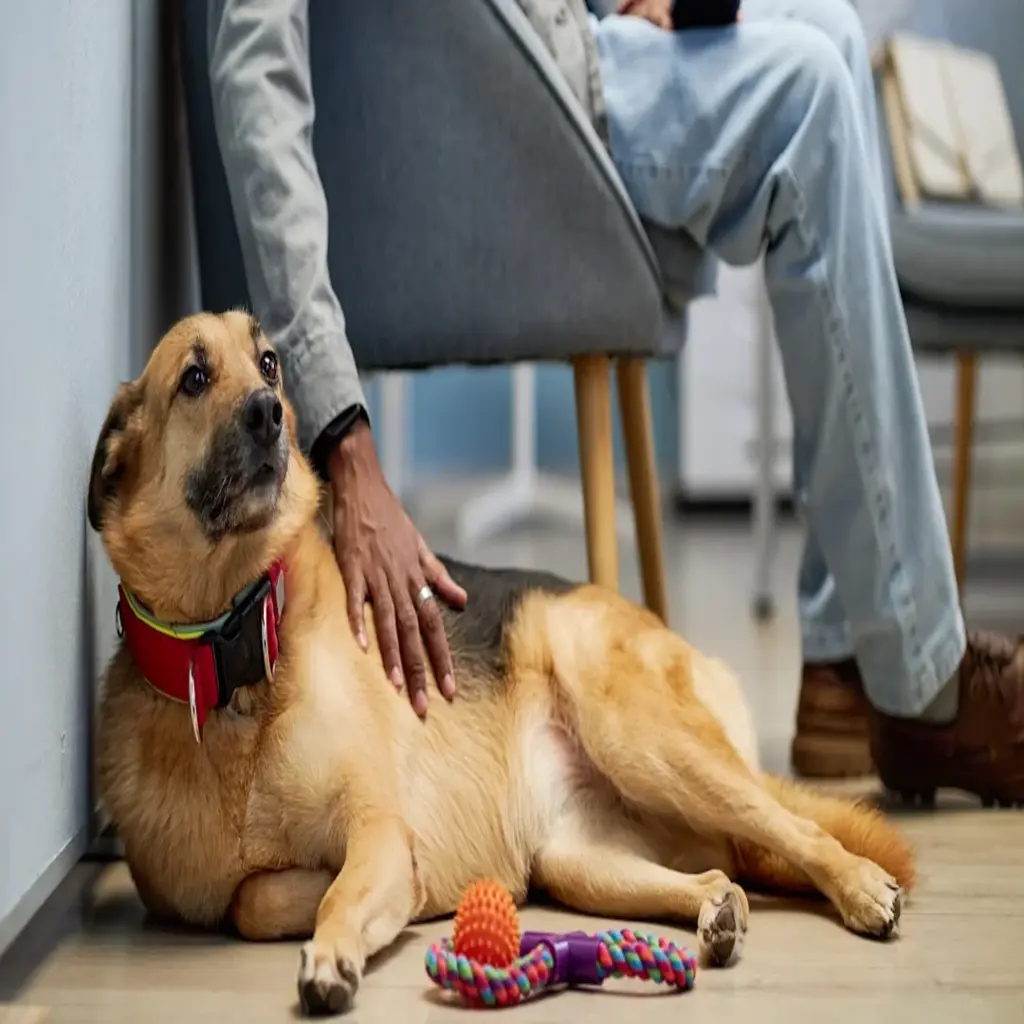
Image Credit – Hemapriya
Intestinal upsets in dogs are more common than many pet owners realize, and they can cause discomfort, lethargy, and sudden changes in appetite. From dietary changes to infections, several factors may disturb your dog’s digestive system. As a responsible pet parent, understanding the causes, symptoms, and remedies for intestinal upsets in dogs is essential for keeping your furry friend healthy and active. This guide explores the main reasons behind these issues, quick relief methods, and preventive steps you can take to reduce the risk of recurring stomach problems in your pet.
Grumbling guts, vomiting, and diarrhea are common problems in dogs that have a variety of potential causes ranging from dietary indiscretion to infection to chronic disease, parasite infestation or poison. It can be a simple as an abrupt change in diet or as complex as metabolic disease.
Intestinal Upsets in Dogs: A Perfect Guide

Occasional bouts of upset may be cured by waiting or by use of an over-the-counter medicine such as Imodium or Pepto Bismol, but cases that last more than a day or two or that escalate in severity should be seen by a veterinarian as soon as possible. Persistent vomiting and diarrhea can lead to dehydration and other complications, and delay in treatment can impede a return to good health or hinder treatment of a serious condition.
Diarrhea
Unfortunately, diarrhea is a familiar symptom in dogs, and the cause is often undiagnosed because the episodes have sudden onset, are easily cured, and occur infrequently.
A symptom of intestinal distress, diarrhea is a change in the frequency and consistency of bowel movements. It can be mild or severe, bloody or not, smelly or not particularly. A dog with diarrhea can also have flatulence, grumbling guts (borborygmus, a wonderfully descriptive term for intestinal bubbling caused by gas), abdominal distention and discomfort, and bad breath. Vomiting may or may not be present.
Some dogs have periodic bouts with diarrhea of undetermined origin, but as long as the symptoms respond well to minimal treatment, no testing is done to determine the origin. Diagnosis of persistent or longstanding diarrhea is critical.
Diarrhea of undetermined origin can often be treated by withholding food for 24 hours to rest the intestines and giving an over-the-counter preparation if advised by a veterinarian. After the period of food withdrawal, a diet of home-cooked diet of boiled hamburger, cottage cheese, or tofu with boiled rice (plain – no flavoring) or tapioca. However, if Ranger is also vomiting or becomes dehydrated, a trip to the clinic is in order.
Diarrhea Causes
Intestinal upset and diarrhea can be caused by stress, bacteria, viruses, parasites, poor digestion, dietary changes, or ingestion of garbage or an indigestible object such as a toy, stick, food wrapper, dirty rag, or other delectable.
Bacterial diseases include Campylobacter jejuni, Salmonella varieties, and Escherichia coli, organisms that may be present without causing problems until Rocky is stressed by underlying disease or infestations or immune system weakness. C. jejuni and Salmonella can infect humans as well, so care must be taken to keep children away from sick dogs, to clean messes carefully, and to wash carefully after handling sick dogs.
Viral causes of diarrhea include distemper, corona, and parvovirus. Distemper and parvo generally attack puppies and young dogs. Corona is a less serious infection that also strikes younger dogs and may accompany distemper disease. Vaccinations are available to prevent all three, although many veterinarians do not recommend corona virus vaccine because the disease is less serious than distemper and parvo.
Parasitic causes of diarrhea include Giardia, Coccidia, hookworms, and whipworms. Giardia and Coccidia are protozoa, tiny one-celled animals that can wreck havoc far beyond their miniscule size. Coccidia infection is rare in dogs; most cases involve puppies in crowded conditions in kennels, pet stores, and animal shelters. Diagnosis is confirmed by fecal flotation to identify the eggs. Treatment is available but prevention through cleanliness, disinfection, and heat treatment of kennel surfaces is preferable.
Giardia is more common, and the form of the protozoa that infects dogs may also infect people. Diagnosis is confirmed by fecal flotation, an examination of a sample of bowel movement to locate protozoal cysts. There is a new vaccine against Giardia and treatment is available.
Food-related diarrhea and weight loss can occur if Rainy cannot digest her food because of an enzyme deficiency or cannot absorb nutrients from the food. Tests are necessary to diagnose these diseases.
Inflammatory bowel diseases of unknown origin can also cause diarrhea. This complex of diseases can affect either the small or large intestine and can be managed with diet and with drugs in some cases. However, there is no cure.
Vomiting
Diarrhea is a result of irritation of the small or large intestine; vomiting is caused by irritation of the stomach. Vomiting should not be confused with regurgitation, the spitting up of food shortly after a meal. Vomiting involves retching – stomach contractions that forcefully expel food from the stomach. It is preceded by restlessness, salivation, and licking the lips. Unproductive retching is a danger signal – the dog could have torsion, a condition in which the stomach flips and cuts off both the openings to the esophagus and the intestine and can cause death in an hour or less. Unproductive vomiting is a cue for an immediate trip to the emergency clinic.
Most acute vomiting is not a sign of serious illness. Vomiting after meals can be caused by eating too much too fast. It can be prevented by putting rocks in the bowl so the dog has to negotiate around them to get his meal or by feeding smaller, more frequent meals. Many dogs vomit after eating grass, but it is not clearly understood why grass produces vomiting at some times and not at others or whether the urge to vomit causes or is produced by grass eating.
Some dogs occasionally vomit a frothy, yellow bile a few minutes after waking in the morning, but this does not affect appetite and is not an indication of disease.
Gastritis – an inflammation of the stomach – can occur if Risky has eaten a substance that irritates his stomach lining or if his stomach does not empty in a timely fashion, or is assaulted by bacterial or viral infection. Gastritis can be acute and episodic or chronic. Acute cases can be treated in the same manner as sporadic diarrhea: withhold food for 24 hours and resume feeding small meals that are home-prepared for a day or two. If he vomits after drinking water, ice cubes will help keep him hydrated without causing additional retching.
Chronic gastritis caused by food retention can be diagnosed by x-rays. Disease involving the stomach wall is difficult to manage, and gastritis caused by underlying cancers are usually fatal.
Vomiting can be an indication that something serious is afoot. In addition to direct stomach involvement, vomiting may be a symptom of disease of the kidneys, liver, or pancreas, or could be induced by drugs, electrolyte imbalance, or stress. Chronic retching, blood vomitus, projectile vomiting, and fecal vomiting are cases for the veterinarian to diagnose.
Frequently Asked Questions
What are the common causes of intestinal upsets in dogs?
Intestinal upsets in dogs can be caused by sudden dietary changes, food intolerance, bacterial or viral infections, and even stress. Identifying the trigger helps in providing the right treatment.
How can I quickly relieve intestinal upsets in dogs at home?
For mild cases, you can try fasting your dog for 12–24 hours, offering plain boiled rice with chicken, and keeping them hydrated. However, persistent intestinal upsets in dogs require a vet’s attention.
Can intestinal upsets in dogs be prevented?
Yes, intestinal upsets in dogs can often be prevented with a consistent diet, clean water, regular deworming, and avoiding harmful foods. Regular vet check-ups also help in keeping their digestive system healthy.






